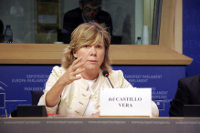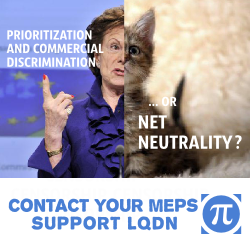On September 11th, the European Commission adopted an important legislative package geared to achieve the European Single Market of telecommunication and build thereby a connected continent.
Since this summer La Quadrature du Net and others have tried to raise attention to the threats contained in the proposal of the European Commission, especially concerning the protection of the Net neutrality principle, which the legislative proposal claims to defend in a deceiving manner1The proposal for a Regulation on the Telecom Package pretends to defend the Net neutrality principle by stating in its article 23.5 that “providers of Internet access services shall not restrict the freedoms [of communication] by blocking, slowing down, degrading or discriminating against specific content, applications or services”, but breaches this principle right before introducing it, allowing in its article 23.2 the provision of “specialised service […] with an enhanced quality of service” – that is to say services offering prioritization. .
This dossier is now on the table of the European Parliament, which is forced to work and make decisions under the pressure of a very tight calendar, conditioned by the upcoming elections and the political need – for each MEP involved in the process – to conclude their mandate with, at least, an intermediary legislative act. Unluckily, this scenario is not favourable to an in-depth, analytical and widespread debate on the different and relevant aspects of the proposal, which is quite technical in nature.
Such a haste carries a high risk of disregard for the position of civil society organizations2In the public hearing on the Commission’s proposal organised within the “Industry” (ITRE) committee on November 28th, no representative of the civil society was among contributors., whose contribution would be absolutely crucial to reach a decision based not purely on economic interests, but also on the defense of the freedom and rights of European citizens.

Del Castillo Vera
Pilar del Castillo Vera (EPP – Spain), Chair of the European Internet Foundation3The European Internet Foundation brings together MEPs of various parties and experts representing often industry and technology interests. is the rapporteur appointed within the European Parliament on that file. Her draft report was considered during an extraordinary meeting of the “Industry” (ITRE) Committee, held in Strasbourg on December 9th. Unluckily, the choice of the French seat, instead of the Belgian one, to hold this important step of the procedure4In the European decision-making process, the consideration of a report is a key moment, allowing citizens to understand what is the nature of the different positions an MEP will take on the file., resulted de facto in a not-fully-transparent debate: no video has been distributed on the European Parliament website, which is apparently due to the absence of dedicated equipments in Strasbourg seat5This is the explanation the services of the European Parliament gave us when we called for more information on the reason why we were not able to access the debate online..
In addition to the non-trivial dysfunctions observed in the process, we’ve already pointed out how the del Castillo’s draft report disregards all the concerns voiced by civil society since last summer. The rapporteur’s refusal to amend sensitive provisions – such as the definition of “specialised services” – would result de facto in inflicting a mortal blow to the Net neutrality principle.
Until next Tuesday, on December 17th, MEPs have the opportunity to table amendments on the proposal of the European Commission and guarantee that EU citizens will be able to exert their freedom of expression and information on the Net. As a citizen platform, La Quadrature du Net provides the PiPhone, a web tool allowing to call Members of the ITRE Committee free of charge, to urge them to include in the final report an uncompromising vision of Net neutrality.

Catherine Trautmann
We feel confident that, with the active support of the shadow rapporteurs, the proposal of the European Commission could be fixed in its critical points. In particular, we welcome Mrs Trautmann‘s (S&D – France) recent declarations at the annual conference of the European Competitive Telecommunication Association, which took place in Brussels on December 3rd. She said she wants to improve the definition of specialised services and obligate the Internet access providers to develop their activities within their networks.
There is good opportunity for this to become the position of the European Parliament. If not, the Net neutrality principle will be undermined and the morphology of our communications and the nature of the information we will be able to access and impart would radically change.
Protecting and defending the Net neutrality principle means thereby allowing the Internet to actively contribute to the functioning of modern democracies and protect citizens against any sorts of discrimination and abuse. If the foundations of that principle are – even barely – compromised, private stakeholders will hamper the normal and natural functioning of the Internet commons – whose rules would be decided by commercial and business logics.
By Miriam Artino, in charge of legal and political analysis for La Quadrature du Net
References



